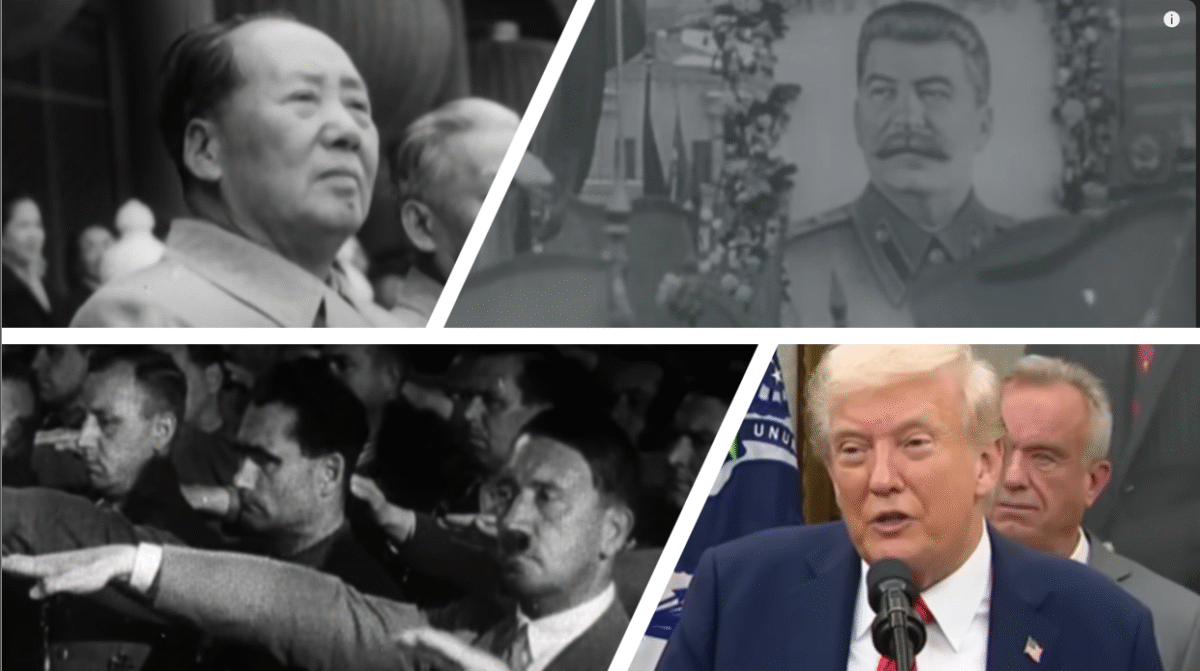The Language of Politics Has Lost Its Meaning
If you’ve watched the news or scrolled social media in the last few years, you’ve probably seen the word “fascist” thrown around like confetti. It’s used so loosely that it’s practically lost its meaning. The term once described the brutal nationalist regimes of the 20th century. Today, it’s often used as a political insult — especially against conservatives or anyone who supports Donald Trump. But to understand why this label is not only wrong but historically backwards, we first have to understand what these words — socialism, communism, and fascism — actually mean.
Socialism: The Government as the “Caregiver”
Socialism starts with a noble-sounding idea: that government should take care of everyone. In theory, it promises equality and fairness through state involvement in the economy. In practice, it means bigger government, higher taxes, and fewer decisions left to individuals. A socialist system allows some private business, but the major industries — like energy, transportation, or healthcare — usually fall under government control. The motivation is “we know better than you.” The result is often inefficiency, dependency, and less innovation.
Many modern Western democracies flirt with socialism without fully embracing it — offering government-run healthcare or extensive welfare systems. But the lesson of history is clear: once government becomes the provider of all things, it becomes the controller of all things.
Communism: Equality by Force
If socialism is a big-government nanny, communism is its all-powerful parent. It abolishes private enterprise altogether and replaces individual ownership with state control. Under communism, there are no private restaurants, no independent farms, and no competing businesses. The state owns and manages everything — and “equality” is enforced by erasing individual freedom.
Communism promises a classless society but delivers the opposite: a small elite with total power and a population stripped of personal choice. The Soviet Union, Mao’s China, and North Korea all claimed to seek equality — yet they produced poverty, oppression, and fear. The problem isn’t just the economics. It’s the ideology that says government knows best and individuals are replaceable.
Fascism: Authoritarianism Wrapped in Nationalism
Fascism sits at a different end of the spectrum — not purely about economics, but about control and power. A fascist regime is ultra-nationalist, anti-democratic, and authoritarian. Think of Mussolini’s Italy or Hitler’s Germany. Both centralized power, crushed dissent, and demanded blind loyalty to the state.
But here’s the key difference: fascism is not the same as conservatism or patriotism. Loving your country doesn’t make you a fascist. In fact, American conservatism is rooted in limiting government power — the exact opposite of fascism’s desire to expand it. Fascism says “the state is supreme.” The American founding says “the people are supreme.”
How “Fascist” Became the Left’s Favorite Insult
Dennis Prager and other scholars of political history have pointed out something fascinating: the use of “fascist” as a label for anyone opposing the Left began with Joseph Stalin himself. In the 1930s, as communism spread, Stalin used the word “fascist” to smear anyone who disagreed with his totalitarian vision — even other socialists who weren’t loyal to him. It was propaganda, pure and simple.
That habit never really went away. Today, when progressives call someone a “fascist,” they’re often repeating a century-old political trick — equating “anti-left” with “evil.” It’s less about definition and more about control. If you can brand your opponents as dangerous, you don’t have to debate them. You just silence them.
Why Trump Gets the Label
So why has the Left decided that Donald Trump — a billionaire businessman and the current President of the United States — somehow embodies fascism? Much of it comes down to emotion over evidence. Trump’s firm stance on crime, border security, and foreign policy has been spun by his critics as authoritarianism, when in reality, it’s a textbook example of constitutional leadership that operates within — and often pushes back against — the limits of our system.
Fascism demands submission to the state, yet Trump’s presidency has been marked by constant and very public opposition. His executive orders are routinely challenged and overturned by activist judges. Every major mainstream media outlet criticizes him daily, and late-night hosts have made entire careers mocking him. When shows like Stephen Colbert’s were eventually canceled, it wasn’t because Trump silenced them — it was because their ratings and revenue collapsed. That distinction matters. In a true fascist regime, they wouldn’t have been allowed to air in the first place. He’s still on the air until his show finishes – and every day he’s bashing trump relentlessly.
Fascism silences dissent; Trump lives in the middle of it. Fascism expands state power; Trump has sought to limit it. His “America First” agenda isn’t about domination — it’s about self-determination, the same principle every sovereign nation claims. Supporting law enforcement isn’t tyranny; it’s order. Defending national borders isn’t extremism; it’s responsibility.
If anything, the constant protests, court battles, and nonstop criticism Trump faces are proof that America remains a free and open democracy. The very ability to oppose the sitting president without fear of punishment is the clearest evidence that the “fascist” label doesn’t just miss the mark — it inverts reality.
The Irony of the Modern Left
Here’s where things get interesting — many of the behaviors the Left warns about under “fascism” are actually appearing within their own movement. Consider this: censorship on social media, government agencies pressuring platforms to suppress certain opinions, and politicians suggesting limits on what news can be shared. Those aren’t conservative tendencies. They’re authoritarian ones.
When government officials collaborate with corporations to control information, or when citizens are punished for questioning official narratives (Facebook & Twitter under Biden), we move closer to the spirit of fascism — not away from it. It’s a painful irony that those shouting “fascist” the loudest are sometimes the ones leaning into its methods.
A Lesson from History: Words Should Mean Something
The danger in misusing words like fascist or Nazi is that it doesn’t just cheapen history — it poisons public discourse. Real fascism murdered millions and destroyed nations. Reducing those terms to partisan insults not only confuses voters and disrespects the victims of those regimes, it also fuels a culture of hostility where unbalanced individuals may feel driven to act on political rage. We’ve seen how heated rhetoric can escalate to threats and even attacks on public figures like we saw with the assassination of Charlie Kirk last month. That’s why measured, truthful language isn’t weakness — it’s a safeguard for democracy itself.
Education, not outrage, is what America needs right now. If we teach people what these systems truly mean — socialism, communism, fascism — we can better protect the values that make the United States different: freedom, individual rights, and limited government. Those are not fascist ideals. They’re anti-fascist in the truest sense.
Trump’s Movement: Populist, Not Fascist
At its core, Trump’s movement is populist — meaning it draws strength from everyday Americans who feel unheard by the political elite. You may agree or disagree with his style, but populism is not fascism. It’s democracy in its rawest form — people reasserting control over the institutions that have forgotten them.
The difference couldn’t be clearer: fascism silences the people; populism gives them a microphone. If anything, the Trump era has been marked by louder voices, freer debate, and more political participation — not less.
The Real Battle Is for Language and Truth
Every generation faces its own battle over language. Ours is over who defines words like “freedom,” “democracy,” and “fascism.” The Left has learned that if it can redefine words, it can reshape reality. But Americans should refuse to play that game. Words matter — and so does history.
Fascism, socialism, and communism are not just political buzzwords; they’re warnings. Each represents a different way freedom can be lost. Understanding those differences is how we make sure it never happens here.
WE’D LOVE TO HEAR YOUR THOUGHTS! PLEASE COMMENT BELOW.
JIMMY
Find more articles like this at SteadfastAndLoyal.com.
We welcome open discussion and thoughtful opinions — even strong disagreements — but comments containing profanity, personal attacks, or hate speech will be removed. Keep it civil, keep it smart, and keep it focused on the ideas.
Editor’s Note: This article reflects the opinion of the author.
h/t: Steadfast and Loyal


Leftists stuck in the Past & cant escape 1866